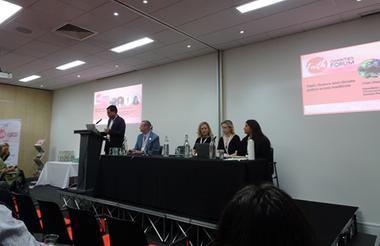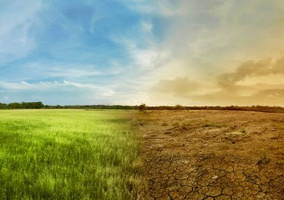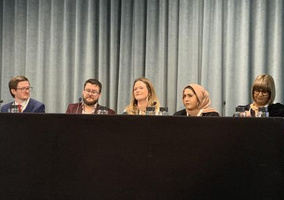Senior staff at several faith charities have said their organisations can play a special role in addressing climate injustice.
Speaking at Civil Society Media’s Faith Charities Forum in London yesterday, leaders from Islamic Relief, CAFOD and the JustMoney Movement all agreed that changes to the way money is invested can be important.
Sarah Edwards, executive director at JustMoney Movement, said: “The banking system finances the fossil fuel economies. We need to shift that money out of fossil fuels and into renewable technologies.
“One of the ways we can act is by switching our bank accounts to a green bank that supports a sustainable future.”
Edwards added that our pension system is contributing to the climate crisis by investing billions in fossil fuels which could instead be funding a transition to a greener future.
Suraiya Rahman, campaigns and public affairs coordinator at Islamic Relief, said her charity prioritised working on climate injustice as many Muslim countries were exposed to the effects of global warming.
“One example that highlights this is Pakistan in the 2022 floods. More than a third of the country was completely submerged by floodwater,” she said.
“Thirty-three million people were directly affected and over $33bn [£24bn] of damage was done to the economy.
“Pakistan’s foreign debt climbed up to $125bn and it plunged six million more people into poverty. Time and again, the poorest are having to put up with the brunt of the climate crisis.
“It is awful that we are having the same conversations about the climate crisis but as faith organisations we are driving the fight against this.
“To tackle this, it is about long-term financial support for these countries and making polluters pay.”
Debt action campaign
Maria Finnerty, lead economist at CAFOD, said that faith charities would become more important voices following recent government welfare cuts by bringing a moral and spiritual perspective to the issue.
Globally, Finnerty said her charity was focused on a campaign for debt relief to be awarded to the world’s poorest countries.
“This crisis is even more severe than the one we saw in the 90s and noughties. We are trying again to bring faith communities together to call for debt justice,” she said.
“Climate vulnerable countries on average spend five times more paying interest on foreign debts than they spend on climate action in their own countries. Some pay up to 40 times more.
“As the climate crisis escalates, we know that the most climate vulnerable countries need around $7tn by 2030 to adequately invest in climate action.
“Instead of these countries receiving these life-saving funds, we are actually seeing under current global economic rules a net outflow of money to the richest countries and profitable multinational corporations.
“The issue is enormous. Without substantial debt relief, without reforming the global debt system, we simply will not see sufficient climate action. That’s why we are all calling for debt action this year.”












